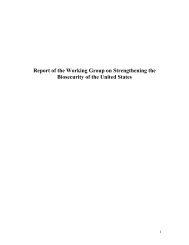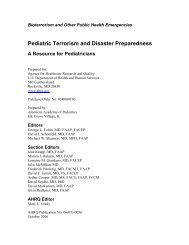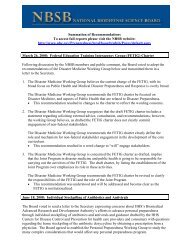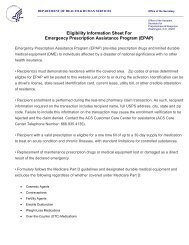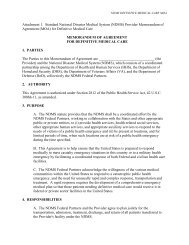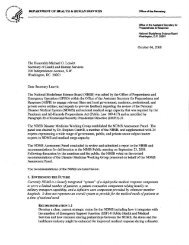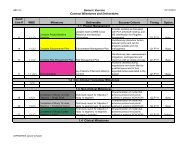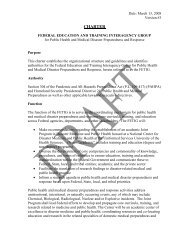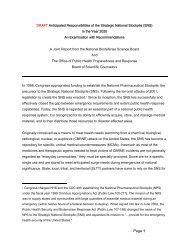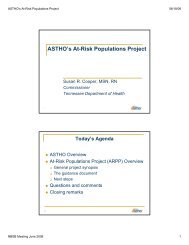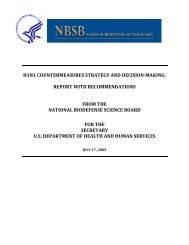(HPP) Performance Measure Manual
(HPP) Performance Measure Manual
(HPP) Performance Measure Manual
Create successful ePaper yourself
Turn your PDF publications into a flip-book with our unique Google optimized e-Paper software.
<strong>HPP</strong> 1.1<br />
<strong>HPP</strong> 1.1: Healthcare System Preparedness<br />
Introduction<br />
Healthcare system preparedness is the ability of a community’s<br />
healthcare service delivery system to prepare, respond, and<br />
recover from incidents that have a public health and medical<br />
impact in the short and long term. The healthcare system role in<br />
community preparedness involves coordination with emergency<br />
management, public health, mental or behavioral health providers,<br />
community and faith-based partners, and State, local, and<br />
territorial governments in order to do the following:<br />
• Provide and sustain a tiered, scalable, and flexible approach to<br />
attain needed disaster response and recovery capabilities<br />
while not jeopardizing services to individuals in the community<br />
• Provide timely monitoring and management of resources<br />
• Coordinate the allocation of emergency medical care<br />
resources<br />
• Provide timely and relevant information on the status of the<br />
incident and healthcare system to key stakeholders<br />
Healthcare system preparedness is achieved through a continuous<br />
cycle of planning, organizing, equipping, training, exercises,<br />
evaluations and corrective actions.<br />
Capability Functions<br />
• Has the HCC established a formal self-governance structure (e.g.,<br />
By-laws for the board of directors and a charter that is<br />
multidisciplinary and representative of all members of the<br />
coalition)?<br />
• Please estimate the total percentage of the State population<br />
covered by each HCC within the State<br />
• Does the HCC include emergency management and public health<br />
as integral partners?<br />
• Has the HCC and its members participated in at least one HSEEPcompliant<br />
exercise to test State, regional and facility-level<br />
healthcare disaster plans considering scenarios identified by a<br />
Hazard Vulnerability Assessment (HVA) within the past year?<br />
• In the past year, did the HCC achieve its established exercise<br />
participation goals for its member organizations engagement in<br />
exercises or real events to test regional State, regional and<br />
facility-level healthcare disaster plan?<br />
• In the past year, did the exercises or real events to test regional,<br />
State, and facility-level healthcare disaster plans demonstrate<br />
the HCC capabilities to function as a coordinated entity?<br />
• Has the HCC successfully implemented “lessons learned” and<br />
corrective actions from an exercise or event within the past<br />
year?<br />
Healthcare System Preparedness<br />
• Develop, refine, or sustain Healthcare Coalitions<br />
• Coordinate healthcare planning to prepare the healthcare<br />
system for a disaster<br />
• Identify and prioritize essential healthcare assets and<br />
services<br />
• Determine gaps in the healthcare preparedness and<br />
identify resources for mitigation of these gaps<br />
• Coordinate training to assist healthcare responders to<br />
develop the necessary skills in order to respond<br />
• Improve healthcare response capabilities through<br />
coordinated exercise and evaluation<br />
• Coordinate with planning for at-risk individuals and those<br />
with special medical needs<br />
<strong>HPP</strong> 1.1: Healthcare System<br />
Preparedness<br />
<strong>Measure</strong> 1.1:<br />
Percent of healthcare coalitions (HCCs) that have established<br />
formalized agreements and demonstrate their ability to function<br />
and execute the capabilities for healthcare preparedness,<br />
response, and recovery as defined in Healthcare Preparedness<br />
Capabilities.<br />
<strong>Performance</strong> Target:<br />
100% by the end of the project period (Year 1 data will be used to<br />
establish baselines).<br />
Data Elements:<br />
• Are there formal documents such as: Memoranda of<br />
Understanding (MOUs), Mutual Aid Agreements (MAAs),<br />
Interagency Agreement (IAAs), articles of incorporation, letters<br />
of agreement, contracts, charters, or other supporting formal<br />
documents?<br />
Thinking It Through<br />
Key Questions To Think Through Before<br />
Beginning to Answer the Data Elements<br />
• Are there formal agreements that bind your HCC together?<br />
• Is the HCC Integrated with the command and control structure<br />
of the local, regional, or State jurisdiction?<br />
• Does the HCC have a collaborative governance structure with<br />
defined roles and responsibilities for HCC leaders and member<br />
representatives?<br />
• What is the population size of the HCC’s geographical area and<br />
the relationship to the State population?<br />
• Does the HCC coordinate/integrate with State, regional, tribal,<br />
county, and city (where applicable) emergency management<br />
and public health for emergency response and recovery<br />
planning?<br />
• Has the HCC and its members participated with regional and<br />
State jurisdictions planning efforts to conduct a coordinated<br />
HVA within in the past 3 years?<br />
• Has the HCC participated in regional or State exercises that<br />
evaluates one of the scenarios identified in the HVA?<br />
• Have “lessons learned” and corrective actions been<br />
implemented?<br />
Pre-Incident<br />
Healthcare<br />
Preparedness<br />
Response<br />
Hospital Preparedness Program (<strong>HPP</strong>) <strong>Performance</strong> <strong>Measure</strong> <strong>Manual</strong>,<br />
Guidance for Using the New <strong>HPP</strong> <strong>Performance</strong> <strong>Measure</strong>s Page | 11



